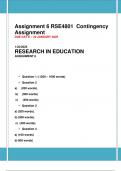Assignment 6 RSE4801 Contingency
Assignment
DUE DAT E : 22 JANUARY 2025
1/22/2025
RESEARCH IN EDUCATION
ASSIGNMENT 6
Question 1: (1200 – 1600 words)
Question 2
a) (200 words).
b) (500 words)
c) (400 words)
Question 3
a) (200 words).
b) (500 words).
c) (400 words).
Question 4
a) (100 words)
b) 800 words)
,c) (500 words)
Detailed solutions
Explanations
Distinction guaranteed 100%
Question 1
(Unit 1): 25 marks
Based on what you have learnt in Unit 1 of the Module, and the Module in general,
write an essay in which you reflect on what you think it takes to become an
internationally acclaimed and respected educational researcher. (1200 – 1600
words)
Reflecting on the Path to Becoming an Internationally Acclaimed Educational
Researcher
The journey to becoming an internationally acclaimed and respected educational
researcher is as much about developing technical expertise as it is about embodying a
commitment to education as a transformative and empowering force. Through Unit 1 of
the Module and the broader themes of the course, it is clear that success in this field
requires a blend of academic rigor, critical thinking, ethical integrity, and the ability to
address complex challenges in diverse educational contexts. This essay reflects on the
key attributes, skills, and mindsets that are crucial for achieving excellence in
educational research.
1. Mastery of Foundational Knowledge
An internationally acclaimed educational researcher must have a deep understanding of
foundational theories, concepts, and methodologies that underpin the field of education.
Unit 1 of the Module emphasizes the importance of studying historical, philosophical,
psychological, and sociological perspectives on education. These perspectives provide
, researchers with the tools to critically analyze educational systems and practices. For
instance, an understanding of Dewey's progressive education theories or Vygotsky's
sociocultural theory enables researchers to frame their inquiries within established
paradigms while also challenging and extending those frameworks.
Moreover, mastery of quantitative, qualitative, and mixed-methods research
methodologies is essential. Researchers must know how to design robust studies,
analyze data, and interpret findings to contribute valuable insights to the field. Technical
skills such as statistical analysis, coding for qualitative data, and using software tools
like SPSS or NVivo are indispensable.
2. Commitment to Lifelong Learning
Education is an ever-evolving field influenced by technological advancements, social
changes, and policy shifts. Therefore, an educational researcher must embody a
commitment to lifelong learning. This involves staying updated on emerging trends,
engaging with contemporary debates, and continuously refining one’s research skills.
Unit 1 highlights how a growth mindset is critical for navigating the complexities of
educational research. For instance, adapting to the increasing role of artificial
intelligence in education requires researchers to explore new methodologies and
examine the ethical implications of technology in learning environments. By staying
curious and adaptable, researchers can maintain relevance and contribute meaningfully
to the global discourse.
3. Ethical Integrity and Responsibility
Ethics play a pivotal role in educational research, as the subjects of study often include
vulnerable populations such as children and marginalized communities. Researchers
must ensure that their work adheres to principles of justice, beneficence, and respect for
persons. This includes obtaining informed consent, ensuring confidentiality, and
avoiding biases that could skew findings or perpetuate inequalities.
Reflecting on Unit 1, I recognize the importance of aligning research with the broader
goal of social justice. For example, studying the educational experiences of
underprivileged learners should not only highlight disparities but also propose
actionable solutions to bridge gaps. Ethical integrity also extends to transparency in
data reporting and acknowledging limitations to avoid misrepresentation of findings.





